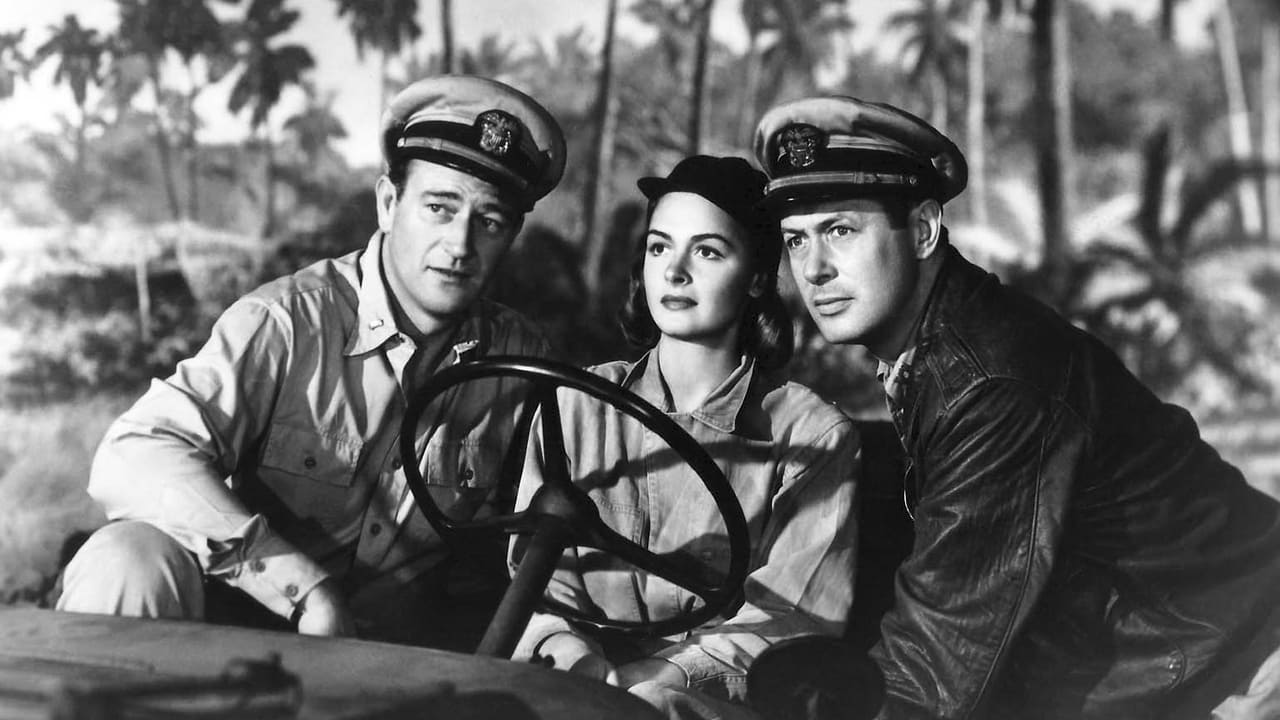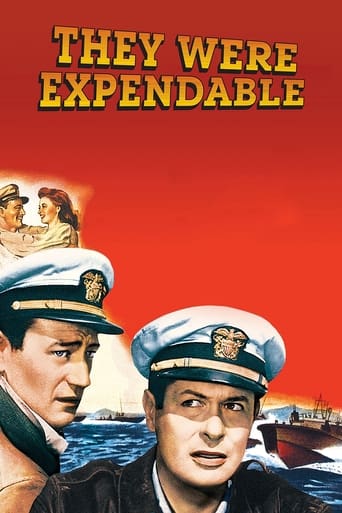

Although director John Ford didn't appreciate Herbert Stothart's musical score (or apparently very much else about this production), I thought that the music had a major impact on the emotional power of this outstanding World War II film. Having read several recent user reviews, I was very surprised that not one of them even mentioned the very influential effect that Stothart's score had on the entire mood, which was quite often melancholy and even gloomy. Whether you like or dislike the music, its overall contribution to this film cannot be overlooked. Personally, I love the music along with just about every other component of this fine film.Examining the long list of John Ford's films, this stands among my favorites. I realize that many enthusiasts of the western genre probably won't agree with me. According to John Wayne, Ford poured his heart and soul into this movie but then reportedly expressed his disappointment with the final results, that is until he was coaxed into actually watching it and then abruptly changed his mind.For me, this also features performances that rank among the finest of the three main stars, John Wayne, Robert Montgomery, and Donna Reed, whose efforts created very convincing, credible characters. An uncle of mine, now deceased, fought in the Battle of Okinawa, which, unlike the Philippines, was a pivotal Allied success, but it still came at a huge human price. My uncle never recounted his war experiences with anyone other than fellow combat vets, so he probably would not have shared them with me even if I valued them as I should have during my mostly unconscious, frivolous childhood. Like the PT crews in this film, my uncle's precious life was expendable for a much greater goal--to win the war, no matter what the cost of victory meant to individual human beings, and the cost was very high indeed. The message that I received from this film is that it wasn't only the PT boat crews who were expendable. All of those who so nobly served their country and were left behind, for whatever reason, during the fall of the Philippines or, for that matter, on any battlefield were expendable. Before viewing this movie, I never truly understood what it must have been like to be forced to remain on those islands, totally isolated from the rest of the world, while the Japanese advanced so rapidly. Ford's repeated use of closeups powerfully conveyed the quiet, mostly unspoken sense of fear and abandonment among the defeated service people at the time. I also appreciated the sense of drama that Ford created at the nightclub with the news of the attack on Pearl Harbor as there was nothing but open water between Hawaii and the Philippines with Japan located just to the north. Without any prior notice, the American service people stationed there, along with their families and the Filipino civilians, knew that the attack would instantly change their lives forever in ways that they could never imagine at the time.SPOILER ALERT!I checked the spoiler box, but I don't think that it will give away the movie's essential ending by stating that the predicament of Major James Morton (Leon Ames), by itself, summarizes in one, single instance a critical message of this movie. Morton is assigned to the number 31 for the transport out, but there is only room for 30 evacuees on the one plane that is provided. At one point, he takes the place of Number 30, who is a no-show. The engines of the plane rev up, and just as he seems "home free", there is a sudden knock on the door. It's Number 30. Morton is ordered off the aircraft, and he has no choice other than to deplane as directed. As the Japanese rapidly approach, he is left on the ground with the others watching in silence as the evacuation plane takes off over the jungle. That is a very moving scene that I will never, ever forget.
... View MoreStirring WWII film, directed by John Ford, about the contributions of the Navy torpedo boat squadron to the war effort. In addition to the action and wartime heroics, there are subplots about the rivalry between Navy lieutenant Robert Montgomery and frustrated subordinate John Wayne, and a romance that blossoms between Wayne and nurse Donna Reed.Montgomery, a gleeful ham when the role calls for it, offers one of his most subtle and successful performances as the sober squadron commander. Wayne does a great job, as well, playing a character with more layers to him than just a gung-ho war hero. His character is brave, to be sure, but he's also ambitious to rise in rank and a little petulant. Not attributes one immediately thinks of when they think John Wayne. Reed is lovely and charming as ever.It's a little overlong, as many movies over two hours seem to be (then and especially now), but Ford makes the most of it and it never feels padded. Definitely worth a look for Ford and Wayne fans, or anyone who enjoys World War II films. It's one of the best.
... View MoreI've seen this twice and enjoyed it immensely both times. The lack of action does not hinder the quality of this war movie in any way. Rather THEY WERE EXPENDABLE depicts a gamut of emotions that make battle scenes unnecessary. Robert Montgomery, John Wayne, and Donna Reed are masterful in their portrayals of naval officers and nurse. One of my favorite sentimental scenes is the dinner for nurse, Sandy. Reed and Wayne's facial expressions were standouts. Of course, the last scene as the plane flies into the sunset leaving a host of hopeless personnel on the field, is very touching as is the dying officer in Corregidor's tunnel.An able cast of supporting actors, headed by Ward Bond, contribute much to the film. It is the largest role I ever saw for Jack Pennick who was "Doc". Pennick, an actual veteran of several wars plus, certainly was at home in uniform.We all remember that President Kennedy served and was injured while serving on a PT boat and that story is on film. PT boats gave up their torpedoes late in the war as mostly very small targets remained and they assumed rather a a gunboat function.Not your typical war movie but a great one, and it ranks up there with the best.
... View MoreThis is a fairly decent old war movie. I didn't think that there was that much interest in torpedo boats until later, with John Kennedy's history and the TV show with Ernest Borgnine. It does get the grittiness of war down pretty well, and the fact that all of those left in the Phillipines were in a desperate situation. Such as Donna Reed's character, Lieutenant Davis, whose prospects of surviving the war seemed grim. But then that was true of the men in the naval battalion as well. John Wayne, as usual, played John Wayne. Not that there's anything wrong with that. Robert Montgomery was good as well, along with some of the old character actors from that era. Worth a look.
... View More